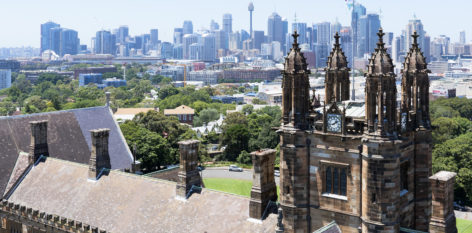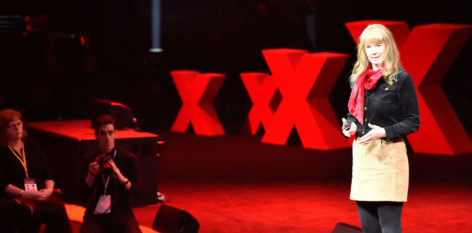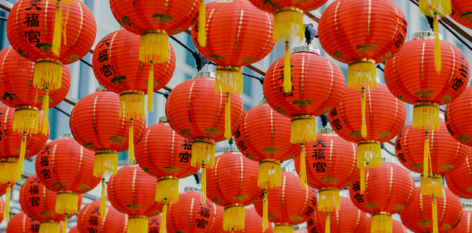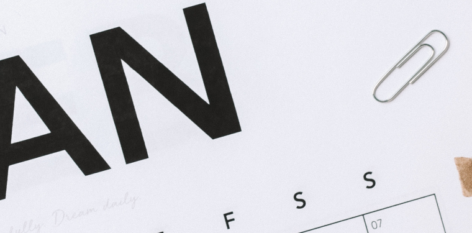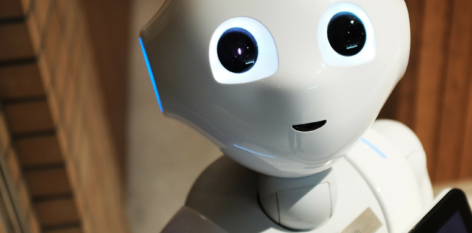TEDxSydney Pitch Night is one of the most highly anticipated of the year. New faces with fresh ideas take the stage for 3 minutes, or 180 seconds to be precise. This year the event was hosted at Foxtel, swathed in festive red lights to match the iconic red TEDx signs.
The speakers shared real stories of overcoming adversity and committing to a vision for a better world. I was struck by the how ideas flowed for overcoming social exclusion and even trauma, by how many solid proposals emerged for transforming healthcare, and by how genuine the speakers were in presenting personal visions for true social impact.
Today, in light of calls for ‘social distancing’, the pitches resonate more powerfully than ever, since they evoke a community of concerned citizens who together cherish human connection and real ways of helping, healing and changing our world.
Care for Australia
The night began with Carolyn Hogg’s powerful evocation of the famous photo, ‘Earth Moon Rising’. Her pitch for creating and preserving biodiversity touched audiences with a moving line about the real conditions we face in Australia today: ‘The bush of our childhood is not going to be the bush that our grandchildren see’.
When she finished, Sana Qadar, Host of the Podcast ‘All in the Mind’ took the stage as the MC for the first session. Sana deserves much credit for warmly welcoming each person with respect and enthusiasm, setting the perfect atmosphere for the audience to listen attentively and with genuine happiness for the person who was getting the chance to share an idea that truly matters to them.
In perhaps one of the more powerful stories of transforming tragedy into care for Australia’s children, Caroline Ghatt shared how the devastating loss of her son led her to fight for inclusive playgrounds, with equipment upgrades that would no longer exclude children with a disability. The effects of social isolation are similar to smoking, she said, but we can work to normalise inclusive playgrounds that enhance the mental health of children as well as parents.
I sat next to Caroline and her husband Tim during the second session and learned that they have started with local playgrounds close to home, installing sensor swings that when ridden unlock a sponsor to fund more playgrounds. I discovered from them how they are turning grief and loss into spaces of joy for others.
Later in the evening, Linda Lynn described opening her Blue Mountains home as emergency, short-term crisis accommodation for bushfire survivors: those who are in real need, who are homeless. Her pitch proposed a model for housing and community care outside the normal operating model in Australia.
Pitches of Personal Inspiration: Seizing the scariest moment
Iris Nastasi, a System Leader in Education, shared how she turned to kickboxing at 45. In a timely message for today, she said that panic and anger lead to absolute failure. Instead, training the mind is much more important than training the body. Although today, describing herself as 54, 5’2’ and 51 kilos, Iris is shattering stereotypes about women.
When I asked Iris after the event how she got started, she shared an amusing story that she was halfway up the stairs, but the smell of the sweat in the gym made her stop and reconsider. Then someone popped their head around a corner and invited her up. She took the risk and came to the realisation that ‘The scariest time is right before you enter’ – a good mantra for all of us.
I also spoke with Jennifer Taylor during the break between pitch sessions and was amazed to learn that she was completing her thesis the same week as Pitch Night. As a medical researcher, she pitched on ‘How your breath can change how you feel and how you perform’ or using breath for both physical and mental health, especially for disassociation and trauma. Fascinated by her research, I asked about her thesis, which, she replied explores these concepts in the field of yoga practices. She is definitely a visionary scientist to follow!
Another inspiring speaker was Christine Jenkins, an athlete and Management Consultant. She made a persuasive pitch: ‘Your next business hire should be an athlete’. She spoke of the dedication and resilience of athletes: taking on board feedback all day from coaches who say ‘No, do it again, no, do it again’. Athletes who trust coaches completely and are themselves coachable. ‘We revere athletes, now it’s time to employ them’, she said. Real words of wisdom for Australia today, especially with the recent cancelations of so many sporting events in light of the health crisis.
Innovative approaches to Healthcare and the Economy
Tal Rapke, a medical doctor and entrepreneur, offered what seemed like a revolutionary idea for health: that we should have a system that empowers us to manage our care outside the hospital. Today, he said, the most frequent therapy is medication. Taking the audience back to the beginning of the last century, he raised the concept that it is possible to live with a chronic condition. We need to rethink Healthcare, he argued, and put power back in our hands to bend the cost curve of health, one prescription at a time.
Empowering ourselves in our care is even more important today with the calls for hand-washing vigilance and with the social imperative not to infect others.
Sustainability consultant Belinda Bean focused her pitch on an answer to the health epidemic of ‘eco anxiety’. Her solution? gardening. She told the audience that her mission was ‘To get you all gardening’. Recalling the WWII campaign ‘Dig for Victory’, which raised both funds and morale for the war effort, she described how good gardening is for mental health, community and even the economy: ‘Growing food is essential printing money’. I found myself fascinated to learn more about she called ‘best practices for regenerative gardening’ – and in our new world of rethinking global food chains and overconsumption, her pitch might offer one step towards a solution.
The power of learning from others in a time of crisis
Jamie Sok made a pitch for feeding the mind through books. For him, books provide a fountain of knowledge and the power to transform ourselves and society. He challenged the audience to read a book in the next 30 days – and good antidote to our screen obsession – and recommended that we could walk down to the local library and feed our minds for free.
I chatted with Jamie on my way out and I loved his notable line: ‘Books are my drug of choice’. As we enter a period of social distancing, books might keep us connected to humanity more than incessant news updates, by allowing us to learn from the lives of others and restock our own knowledge pantry.
Taking the concept of learning from others one step further, scientist and entrepreneur Madeline Green asked, ‘What would it take to stop emitting?’ Her answer: perspective. Getting back in touch with the perspectives of others. She pointed to ignorance and inaction as forms of self-protection. What we need instead, she said, is to reclaim the value of embracing the perspectives of others. I can think of no more timely message today as people are making sacrifices in their own autonomy and public presence for the benefit of others who may not be well enough to fight off a pandemic.
Physiotherapist Corey Iskenderian demonstrated his own ability to see with the perspective of others. He described heartbreak and shame as internal wounds that are hidden to health practitioners. Unlike scars on the skin, such events often leave a deeper impression, and muscles like sensory organs soak in that pain. He bravely mentioned his own deep dive in to grief and darkness, but ended with a note of hope. Mentioning a ballerina with hip pain who was in fact grieving for her dying mother, he urged allied health practitioners ‘to look beyond the pain and get to know the person behind the muscles’. As Helen Keller famously said, ‘The world is full of suffering but also full of overcoming it.’ Inspiring words that I feel we need to hear today, more than ever.
Real adversity turned into activism
John Dor Akech Achiek, a Community Services Worker who left South Sudan during the war and spent time in a Kenyan refugee camp before arriving in Australia, invited us all to consider how our names—what others call us and what we call ourselves—reflect pieces of our identity. He is creating a platform for teaching people about names.
Another speaker whose passion emerged from hard experience was Jean Marie Vianrey Bishop, a midwife who had met a woman in Kenya who had five babies born dead. ‘No mother should die giving birth’, she said, cradling a baby doll on stage to make us feel the reality of her message.
Founder and editor of Ascension Magazine, the first Indigenous Magazine in Australia, Sasha Sarago told of the real consequences of unthinking social commentary. Her t-shirt bore the words that a person had said to her; ‘Too pretty to be Aboriginal’ – those words are not a compliment, she explained. The reality, she said, is that the word ‘pretty’ erases Aboriginality and replaces it with western ideals of beauty. It is a form of cultural genocide. In contrast, Sasha Sarago evoked Barangaroo, a powerful woman who was ‘fierce, defiant and proud’. Barangaroo did not wear colonial attire but instead demonstrated for all what it meant to be grounded in respect, honor and respectability as ‘a powerful Aboriginal woman’.
‘In this dizzying age, ideas are everything’ – Remo Giuffré
Each pitch offered an insight into how we can make real changes in our world:
Dr Joe Dusseldorp, a surgeon, described using 3D printed tissues as implanted technologies, as part of his commitment to eradicate the word ‘incurable’.
Journalist Luke Benedictus celebrated the continued rise of the highly engaged dad who, in contrast to the disciplinarian breadwinner of the 1970s, helps children grow up with more confidence, reliability and self control while also ‘unshackling’ women from sole domestic responsibility.
Johnny Shannon, CEO, discussed micro sensor technology that can address the global food shortage or detect cancer. Arkadiusz Bryl proposed that people don’t need financial advice, they need to spend 45 minutes asking themselves the right questions and writing answers down in order to change their lives. Michael Kollo explored issues of bias and trust in AI and algorithms.
Ganne Poyrecbna, Professor of Data Analytics, argued that gender diversity in the workplace begins with raising boys. Do things for the public good, not just for yourself, she argued, offering us an important message for today.
The pitches asking challenging questions:
Speech pathologist and researcher Amanda Miller Amberber asked, ‘What if you couldn’t communicate?’ Her work raises attention for people with Aphasia, the condition that afflicts stroke survivors who can no longer talk, write, read or sign, yet they are still themselves inside. She shared tips for communicating yet made it clear that we all need that training. It’s the responsibility of all of us to learn how to communicate.
School principal, author and teacher trainer Gavin McCormack, the most compelling story-teller of the evening, asked how can education save the world? He made a case for communication in education. He told of Oliver, a little boy new to school who was taken by the hand his first day by a kind student and how that act of generosity will change Oliver into a leader who will fight for others with compassion – exactly what we need today and how, he proposed, education can save the world.
Vivienne Black made the audience question the very definition of a ‘professional’. She outlined a persuasive argument for sex workers deserving to be seen as professionals and being shown the courtesies—and offered the business mentoring— that other professions get.
Some time for fun on stage
Living up to the ‘entertainment’ promise of TEDx, several presenters demonstrated theatrical flair. And the job of the audience? ‘Make everybody feel the love’ as Fenella Kernebone said.
Lucas Christian, an artist, performed the importance of Style: ‘a thing that makes you you’ – His invitation? ‘Have fun being you.’ Rochi Sanghi used her body to make a pitch: she danced on stage to demonstrate the meditative practice of Kathak, or percussion feet.
Phil Carey spoke about creativity, Jono Lineen shared stories of walking barefoot and experiencing flow, and comedian Emma Malik described using operant conditioning to train Rocky, a 360 kg salt-water crocodile.
A time for asking: What is your reality?
Another artist, Alice Chance, a composer, delivered one of the most understated but serious pitches. She took on the most-frequently asked question that musicians and other fine arts majors receive: ‘How do you make a living?’ She shared her story of taking on commissions and making someone else’s ideas become reality. But then her pitch swerved to a profound question: ‘What is the true cost of nailing the brief or being in demand?’ She challenged the audience to reflect: what story might you share? What would you like to do? You are the journalist of your own life.
It was a powerful message, about how our realities can become scripted by others, whether in our professions, our health, our communities or even in our responses to adversity and struggle. Although the pitches were only three minutes each, their messages and inspiring ideas resonate today more than ever as we face unparalleled times of global crisis and the need for us to come together, as Australians and as citizens of our interconnected world.

